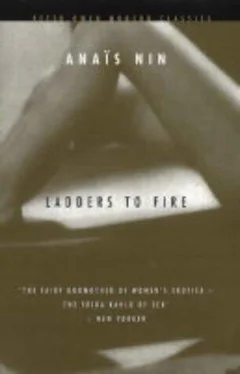Anaïs Nin - Ladders to Fire
Здесь есть возможность читать онлайн «Anaïs Nin - Ladders to Fire» весь текст электронной книги совершенно бесплатно (целиком полную версию без сокращений). В некоторых случаях можно слушать аудио, скачать через торрент в формате fb2 и присутствует краткое содержание. Год выпуска: 2004, ISBN: 2004, Издательство: Peter Owen Limited, Жанр: Классическая проза, Эротические любовные романы, на английском языке. Описание произведения, (предисловие) а так же отзывы посетителей доступны на портале библиотеки ЛибКат.
- Название:Ladders to Fire
- Автор:
- Издательство:Peter Owen Limited
- Жанр:
- Год:2004
- ISBN:9780720611625
- Рейтинг книги:5 / 5. Голосов: 1
-
Избранное:Добавить в избранное
- Отзывы:
-
Ваша оценка:
- 100
- 1
- 2
- 3
- 4
- 5
Ladders to Fire: краткое содержание, описание и аннотация
Предлагаем к чтению аннотацию, описание, краткое содержание или предисловие (зависит от того, что написал сам автор книги «Ladders to Fire»). Если вы не нашли необходимую информацию о книге — напишите в комментариях, мы постараемся отыскать её.
Cities of the Interior
Children of the Albatross
The Four-Chambered Heart
A Spy in the House of Love
Solar Barque
Ladders to Fire — читать онлайн бесплатно полную книгу (весь текст) целиком
Ниже представлен текст книги, разбитый по страницам. Система сохранения места последней прочитанной страницы, позволяет с удобством читать онлайн бесплатно книгу «Ladders to Fire», без необходимости каждый раз заново искать на чём Вы остановились. Поставьте закладку, и сможете в любой момент перейти на страницу, на которой закончили чтение.
Интервал:
Закладка:
At least she could be considered as attending the party: her eyes were not closed, as they had been a half hour earlier when she was telling the Chess Player about phosphenes: phosphenes are the luminous impressions and circles seen with the eyelids closed, after the sudden compression of the eyeball. “Try it!”
The guitar distilled its music. Rango played it with the warm sienna color of his skin, with the charcoal pupil of his eyes, with the underbrush thickness of his black eyebrows, pouring into the honey-colored box the flavors of the open road on which he lived his gypsy life: thyme, rosemary, oregano, marjoram and sage. Pouring into the resonant sound-box the sensual swing of his hammock hung across the gypsy-cart and the dreams born on his mattress of black horsehair.
Idol of the night clubs, where men and women barred the doors and windows, lit candles, drank alcohol, and drank from his voice and his guitar the potions and herbs of the open road,charivaris of freedom, the drugs of leisure and laziness, the maypole dance of the fireflies, the horse’s neighing fanfaronade, the fandangos and ridottos of sudden lusts.
Shrunken breasts, vacillating eyes, hibernating virilities, all drank out of Rango’s guitar and sienna voice. At dawn, not content with the life transfusion through cat guts, filled with the sap of his voice which had passed into their veins, at dawn the women laid hands upon his body like a tree. But at dawn Rango swung his guitar over his shoulder and walked away.
Will you be here tomorrow, Rango?
Tomorrow he might be playing and singing to his black horse’s philosophically swaying tail on the road to the south of France.
Now arrived a very drunken Jay with his shoal of friends: five pairs of eyes wide open and vacant, five men wagging their heads with felicity because they are five. One a Chinese poet, tributary of Lao Tze; one Viennese poet, echo of Rilke; Hans the painter derived from Paul Klee; an Irish writer feebly stemming from Joyce. What they will become in the future does not concern them: at the present moment they are five praising each other and they feel strong and they are tottering with felicity.
They had had dinner at the Chinese restaurant, a rice without salt and meat with tough veins, but because of the shoal beatitude Jay proclaimed he had never eaten such rice, and five minutes later forgetting himself he said: “Rice is for the dogs!” The Chinese poet was hurt, his eyelids dropped humbly.
Now as they walked up the stairs he explained in neat phrases the faithfulness of the Chinese wife and Jay foamed with amazement: oh, such beautiful faithfulness!—he would marry a Chinese woman. Then the Chinese poet added: In China all tables are square. Jay almost wept with delight at this, it was the sign of a great civilization. He leaned over perilously and said with intimate secretiveness: In New Jersey when I was a boy tables were always round; I always hated round tables.
Their feet were not constructed for ascensions at the present moment; they might as well remain midway and call at Soutine’s studio.
On the round stairway they collided with Stella susurrating in a taffeta skirt and eating fried potatoes out of a paper bag. Her long hair swayed as if she sat on a child’s swing.
Her engaging gestures had lassoed an artist known for his compulsion to exhibit himself unreservedly, but he was not yet drunk enough and was for the moment content with strumming on his belt. Stella, not knowing what spectacle was reserved for her in his imagination, took the offering pose of women in Florentine paintings, extending the right hip like a holy water stand, both hands open as if inviting pigeons to eat from her palms, stylized, liturgical, arousing in Manuel the same impulse which had once made him set fire to a ballet skirt with a cigarette.
But Manuel was displaced by a figure who moved with stately politeness, his long hair patined with brilliantine, his face set in large and noble features by the men who carved the marble faces in the hall of fame.
He bowed ciously over women’s hands with the ritualistic deliberateness of a Pope. His decrees, issued with handkissing, with soothing opening and closing of doors, extending of chairs, were nevertheless fatal: he held full power of decision over the delicate verdict: is it tomorrow’s art?
No one could advance without his visa. He gave the passports to the future. Advance…or else: My dear man, you are a mere echo of the past.
Stella felt his handkissing charged with irony, felt herself installed in a museum not of modem art—blushed. To look at her in this ironic manner while scrupulously adhering to medieval salutations this man must know that she was one to keep faded flowers.
For he passed on with royal detachment and gazed seriously for relief at the steel and wood mobiles turning gently in the breeze of the future, like small structures of nerves vibrating in the air without their covering of flesh, the new cages of our future sorrows, so abstract they could not even contain a sob.
Jay was swimming against the compact stream of visitors looking for re-enforcement to pull out the Chinese poet who had stumbled into a very large garbage can in the front yard, and who was neatly folded in two, severely injured in his dignity. But he was arrested on his errand by the sight of Sabina and he thought why are there women in whom the sediment of experience settles and creates such a high flavor that when he had taken her he had also possessed all the unexplored regions of the world he had wanted to know, the men and women he would never have dared to encounter. Women whose bodies were a labyrinth so that when he was lying beside her he had felt he was taking a journey through the ancient gorge where Paracelsus dipped his sick people in fishing nets into lukewarm water, like a journey back into the womb, and he had seen several hundred feet above his head the little opening in the cathedral archway of the rocks through which the sun gleamed like a knife of gold.
But too late now to dwell on the panoramic, great voyage flavors of Sabina’s body: the Chinese poet must be saved.
At this moment Sabina intercepted a look of tenderness between Jay and Lillian, a tenderness he had never shown her. The glance with which Lillian answered him was thrown around him very much like a safety net for a trapezist, and Sabina saw how Jay, in his wildest leaps, never leaped out of range of the net of protectiveness extended by Lillian.
The Chess Player noted with a frown that Sabina picked up her cape and made her way to the imitation Italian balcony. She was making a gradual escape; from the balcony to balcony, she would break the friendly efforts made to detain her, and reach the exit. He could not allow this to go on, at a Party everyone should pursue nothing but his individual drama. Because Lillian and Jay had stood for a moment on the same square and Sabina had caught Jay leaping spuriously into the safety net of Lillian’s protectiveness, now Sabina acted like one pierced by a knife and left the game for a balcony.
Where she stood now the noises of the Party could not reach her. She heard the wind and rain rushing through the trees like the lamentation of reeds in shallow tropical waters.
Sabina was lost.
The broken compass which inhabited her and whose wild fluctuations she had always obeyed, making for tumult and motion in place of direction, was suddenly fractured so that she no longer knew the relief of tides, ebbs and flows and dispersions.
She felt lost.
The dispersion had become too vast, too extended. For the first time a shaft of pain appeared cutting through the nebulous pattern. Pain lies only in reflection, in awareness. Sabina had moved so fast that all pain had passed swiftly as through a sieve, leaving a sorrow like children’s sorrows, soon forgotten, soon replaced by a new interest. She had never known a pause.
Читать дальшеИнтервал:
Закладка:
Похожие книги на «Ladders to Fire»
Представляем Вашему вниманию похожие книги на «Ladders to Fire» списком для выбора. Мы отобрали схожую по названию и смыслу литературу в надежде предоставить читателям больше вариантов отыскать новые, интересные, ещё непрочитанные произведения.
Обсуждение, отзывы о книге «Ladders to Fire» и просто собственные мнения читателей. Оставьте ваши комментарии, напишите, что Вы думаете о произведении, его смысле или главных героях. Укажите что конкретно понравилось, а что нет, и почему Вы так считаете.












